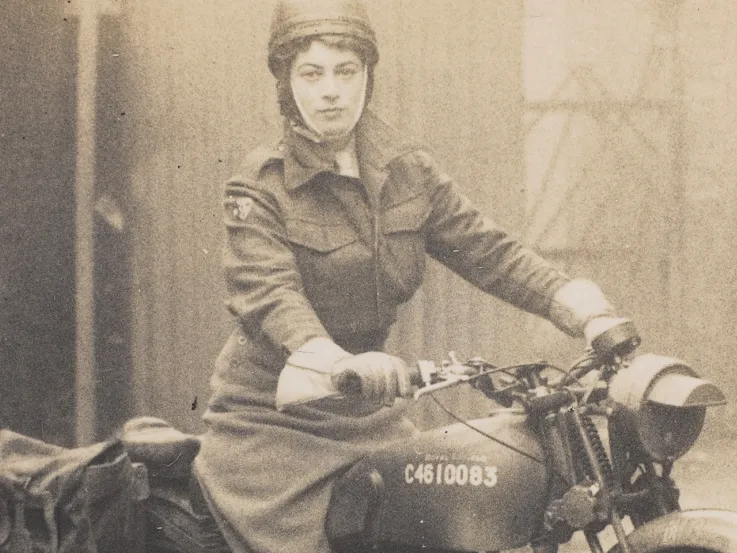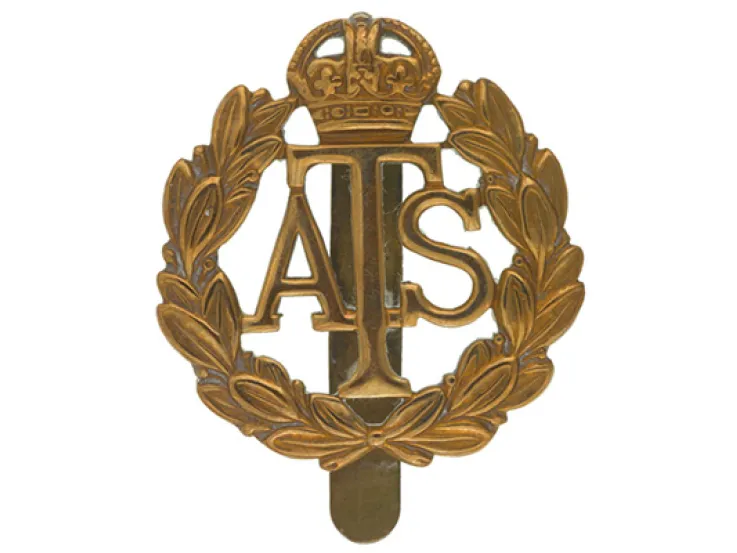Transcript: Before the war
Audio transcript
Mary Coomer:
I seem to have always been either doing something in the forefront of something. When I was a textile designer, for instance, um, I went to Manchester Art College, they have what they call the Compton exhibition, when all your work that you've done for the three years, and the cotton manufacturers - of which there were lots and lots in 1936 - came to see your work and no name was on it.
Well, the, uh, males and females had classes together, and they, there was, you had a number on your part of the exhibition, now, if they, people that ran factories, mills, cotton mills came and looked and took to somebody's type of designing, they'd say, would you send number whatever - I was one or two as it happens - uh, for an interview with me and to bring their folio.
Well, the first one I went to was Tootal Broadhurst Lee. He asked to see me, and I went up with my folio, arranged through the college. When I got there, he said, I'm terribly sorry I didn't realise until Mr O’Brian was on the phone that you were a female. He said we only have male designers. He said but if you'd like to come, and be a colourist.
Now if you buy, if you go and see a design in a shop of materials, say curtain material, you'll see, uh, it in four different ways, most of it pink, most of it blue, most of it green or whatever, most of it yellow, same pattern. But he said, you could come and be a colourist for one of the designers, and I can remember I looked at him I said, I'm not going to college for three years to colour somebody else's designs. So he said, well I'm sorry we haven't got any female designers, we don't employ them, we only employ male designers.
So I thought to hang this, so on my own bat, without having been asked to go for an interview, I was in Manchester to go Tootal Broadhurst Lee and I thought, well, Horrockses are in Piccadilly I'll go and see if they had any. And I went up and I hadn't gotten a time for an interview and he, uh, the personnel bod came out and saw me and he said, but we haven't got any, you want a job as a designer? And I said yes. So he said, well, uh, Mr Nuttall, that's in charge of the design room here is going to Preston, to the works, our works were at Preston, Horrockses Mills, he said, but I'll have a word with him.
So he went and had a word with him, and Mr Nuttall came down to see me in his office, Mr Madders’ office. And he said, well, we haven't had any, but you know, I'm quite game try one. But he said, how many males in your class are looking for work? So I said, well, there were four who were doing textile design, two are fixed up, there’s two still looking, and he chatted to Mr Madders and said, well, what if one of these come looking for a job? So he said, will you go outside for a few minutes, and I left my work there, and I went outside and he came, he called me in, and he said look, in six months’ time, I'm going to start a design room, in Preston, this one will still be here, if we find you a job in the office for six months, will you work in the office for six months? If I promise you, that when I go, you will go up into the design room with the four people that are up there? So I jumped at it, I said yes.
So I worked in the shipping department for six months, just doing invoices and things, for going, being put out and went in the design room, there I was when I was called up.
Now, when I was called up, they didn't know what to do with me because Horrockses promised that all the men who were in the TA, who were called up for the war, for the first year of their being called up, they would make their wages up the difference between the pay they were earning in the army and the pay they were earning Horrockses, and they would send that difference to their wives or mothers, whoever it will happen to be. Then they got to me, and I was the only one that was in the TA, in the whole of 107 Piccadilly Manchester. So they said what should we do, with, with you? And I showed them my calling up papers, said I had to go the next day, and I wouldn't be in to work on the Monday.
Anyway the war was declared on the Sunday, so I said, right, so after I had been, before we moved out from the local barracks, to Margate, my mother had a letter saying that, as I was the only female staff to be called up as a territorial, that they would send her 10 shillings a week, uh, for the first year that I was called up, providing I didn't leave the army or get married. If I got married or left the army, I was to let them know [laughing] so until I got married, my mother had 10 shillings a week sent to her.
Description
This transcript is from a 1995 interview with Mary Coomer. (NAM. 1995-06-56)
Mary served in the Auxiliary Territorial Service from 1938 to 1945. She was one of the first to be selected to go to France with the British Expeditionary Force (BEF). After evacuating back to England in 1940, she served on the Home Front for the rest of the Second World War.



